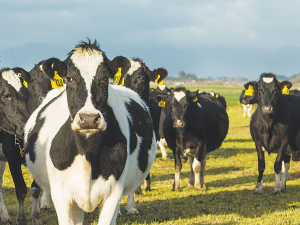Editorial: Happy days
OPINION: The year has started positively for New Zealand dairy farmers and things are likely to get better.
 Simon Andrew, MPI, says it's really critical that farmers fully comply with the NAIT process and keep accurate records.
Simon Andrew, MPI, says it's really critical that farmers fully comply with the NAIT process and keep accurate records.
The Government says it's got a high degree of confidence that Mycoplasma bovis found on a Mid-Canterbury dairy farm isn't widespread.
A couple of weeks ago the Ministry for Primary Industries (MPI) revealed that a case of M. bovis had been confirmed on a farm near Ashburton. But Simon Andrew, MPI director of the M. bovis programme, told Dairy News that the investigation is still in its early stages.
"I think the key point for us at the moment is that given the level of surveillance we are undertaking and the very low level of infection we are finding, this would indicate the disease isn't widespread," he says.
News of this outbreak comes just weeks after the Prime Minister and Minister of Agriculture proudly announced that M. bovis had all but been eradicated and was confined to a single farm. But Andrew says it's not uncommon to find an additional case of M. bovis when you get to the tail end of an eradication programme or in the spring or autumn.
Through their bulk tank milk testing, they tested every dairy farm across the country on a monthly basis, now twice monthly, so "we do a huge amount of surveillance," he says.
"Last year we did close to 100,000 tests on bulk tank milk samples and, in addition to that, close to 400,000 cattle were sampled on farm," he says.
Andrew says he's not prepared to give any details about the infected farm, to protect the privacy of the farmer and their family. He says MPI's role is to manage the disease and look after the welfare of the farmer involved.
"First and foremost we have to make sure the farm is well supported because when this happens, it has a profound impact on the farmer, the family and the wider communtiy and that is really important.
"Then we work with the farmer to understand the movement of cattle and ensure that there are good NAIT records. Another phase is working with the farmer and the epidemiology team to undertake the analysis of the infection on the farm," he says.
Andrew says they then look at what movement restrictions of animals to apply on an infected farm, but at the same time endeavouring to minimise the impact of this on the overall farming operation, which is not alwas easy.
As well as the ongoing testing programme on the infected farm, MPI will be checking neighbouring farms to make sure the disease hasn't spread. They'll be checking NAIT records - a very important part of the process to determine animal movements. Simon Andrew says it's really critical that farmers fully comply with the NAIT process and keep accurate records.
"In a situation like this, accurate NAIT records improve the chances of finding the disease quicker and this applies not only to M. bovis but to other biosecurity risks and responses."
Farmers must remain vigilant and adopt good on-farm biosecurity practices, says Andrew.
He says it's not just NAIT, but also making sure they have secure boundary fences so that animals on one farm cannot interact with animals on an adjacent property. He says farmers on larger properties can create separate units within a farm to keep a mob of animals way from another mob.
Finally, Andrew says, "broadly speaking" there is still room for improvement in NAIT compliance.
Meadow Fresh has created the world's first fantasy sports league powered by real cows.
This year, 'Foodie February' sees potatoes take the spotlight as one of New Zealand's most powerful and versatile food heroes.
A multi-cultural team is helping to establish one of New Zealand's largest plantings of premium eating grapes - while learning each other's languages and cultures along the way.
The World Wide Sires National All Day Breeds Best Youth Camp Best All Rounder plaudit has become family affair, with 2026 Paramount Cup winner Holly Williams following in her sister Zara's footsteps.
DairyNZ is giving New Zealand farmers a unique opportunity to gain hands-on governance and leadership experience within the dairy sector.
Herd improvement company LIC has posted a 5.2% lift in half-year revenue, thanks to increasing demand for genetics.
OPINION: Fonterra may be on the verge of selling its consumer business in New Zealand, but the co-operative is not…
OPINION: What does the birth rate in China have to do with stock trading? Just ask a2 Milk Company.